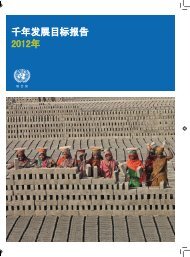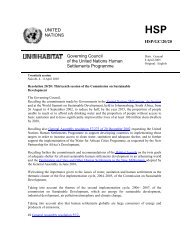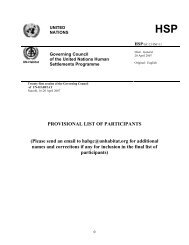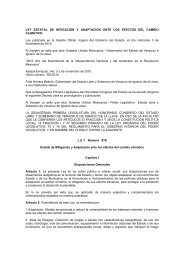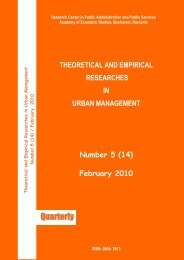Harmonious cities - UN-Habitat
Harmonious cities - UN-Habitat
Harmonious cities - UN-Habitat
Create successful ePaper yourself
Turn your PDF publications into a flip-book with our unique Google optimized e-Paper software.
IN-FOCUS Energy<br />
Cities like Rio de Janeiro were one of the first to realise that energy efficiency is the only way forward Ph o t o © jo n A S me l l Q v i S t<br />
have tackled technical risk by collaborating<br />
with the Inter-American Development Bank<br />
to establish a new financial tool, the Energy<br />
Efficiency Guarantee Mechanism. This operates<br />
effectively as an insurance product for<br />
the lending banks against the risk of technical<br />
failure by the energy service company in<br />
38<br />
u r b a n<br />
WORLD<br />
November 2008<br />
its mission to reduce consumption and make<br />
the projected savings on energy costs.<br />
The importance of the project lies not only<br />
in the environmental benefits for Brazil but<br />
also for the rest of the world.<br />
“This is very important in the sense that<br />
if we do it right in Brazil we should be able<br />
By 2030 the use of coal could rise by 73 percent according to the International Energy Agency<br />
Ph o t o © St e v e ed W A r d S<br />
to replicate it in other countries,” says Peter<br />
Stevenson, Principal Investment Officer at<br />
the Inter-American Development Bank. “We<br />
see this as a pilot project that may stimulate<br />
banks to invest in further energy efficiency<br />
projects.”<br />
Some energy companies dedicate 0.25 percent<br />
of annual revenues to energy efficiency<br />
projects in customer facilities and general<br />
conservation education efforts. The wire<br />
charge fund provided about USD 250 million<br />
to efficiency initiatives between 1998 and<br />
2004 and many utilities work with energy<br />
service companies to fulfill these requirements,<br />
helping the industry grow.<br />
Financial benefits for Brazil in developing<br />
the industry are also a key motivator, and its<br />
success could prove to be the impetus for the<br />
blossoming of a domestic industry. “This is<br />
not about attracting foreign energy service<br />
companies,” says Mr. Langlois. “It’s about<br />
building an ESCO market within Brazil that<br />
is strong enough to operate by itself.” u<br />
Note: this article is based in part on<br />
interviews conducted for the IDB magazine<br />
Multilateral.







